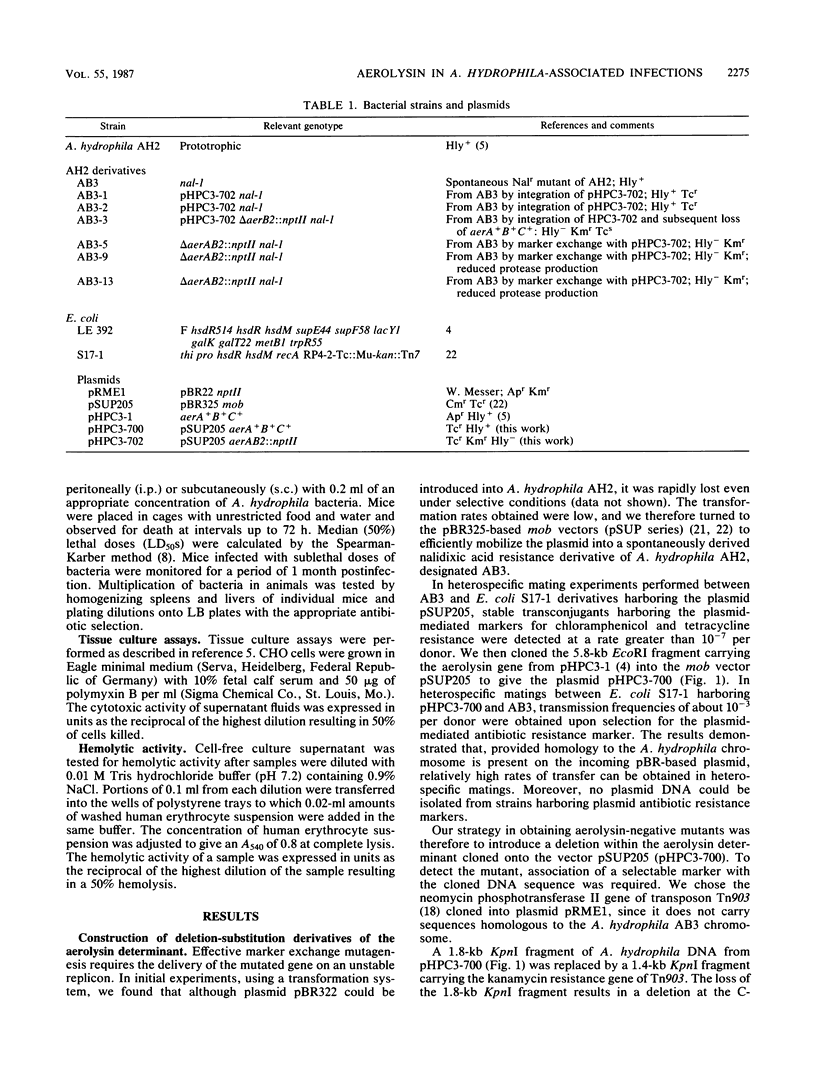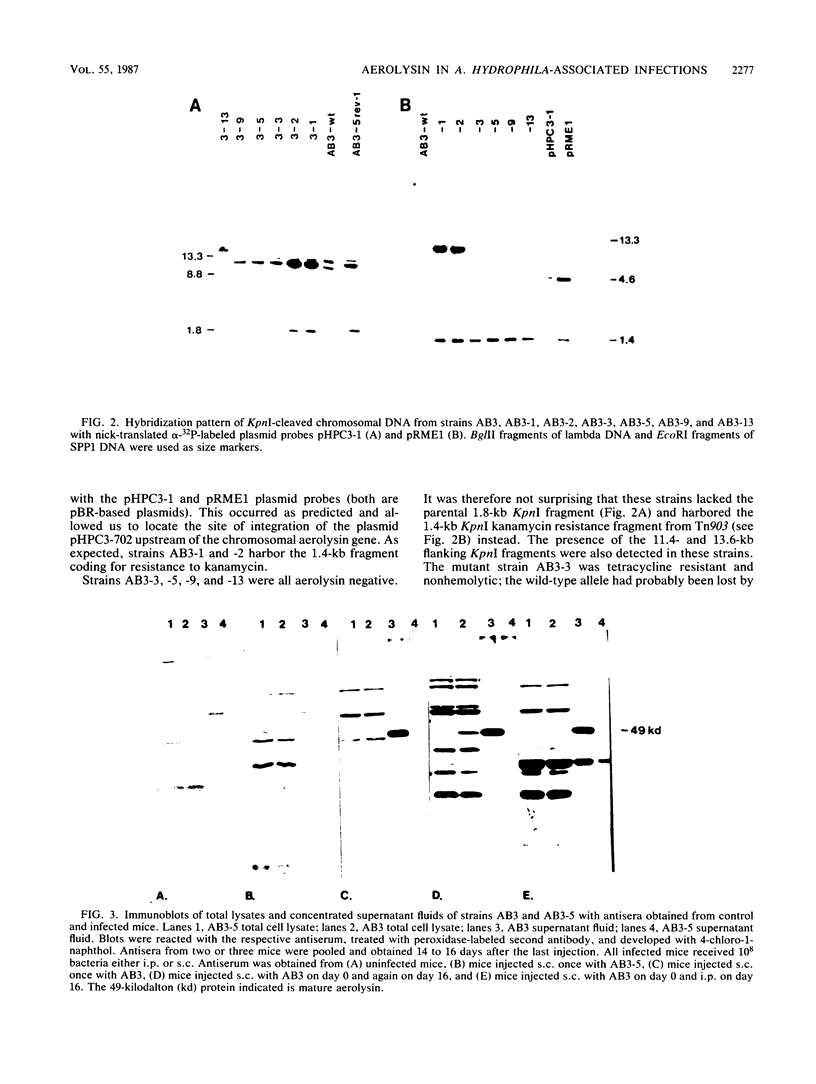Abstract
We report here on the isolation of isogenic strains of Aeromonas hydrophila AB3 deleted for a segment of the aerolysin gene. All aer mutants obtained lacked the 49-kilodalton aerolysin gene product and were neither hemolytic for blood erythrocytes nor cytotoxic for Chinese hamster ovary tissue culture cells. One such mutant, AB3-5, was used in a mouse toxicity model to evaluate the role of aerolysin in the pathogenesis of A. hydrophila infections. The strain had a 50% lethal dose (LD50) of greater than 10(9) as compared with the parental strain which had an LD50 of 5 X 10(7). Reintegration of the deleted segment into AB3-5 resulted in an LD50 of 6 X 10(7) cells for this revertant. Furthermore, all mice injected with a sublethal dose of the parental strains developed necrotic lesions; this was never obtained with the aerolysin-deficient strain AB3-5. More importantly, specific neutralizing antibody to aerolysin was detected in mice surviving A. hydrophila infection, demonstrating that aerolysin is produced during the course of systemic A. hydrophila infections.
Full text
PDF






Images in this article
Selected References
These references are in PubMed. This may not be the complete list of references from this article.
- Blake P. A., Weaver R. E., Hollis D. G. Diseases of humans (other than cholera) caused by vibrios. Annu Rev Microbiol. 1980;34:341–367. doi: 10.1146/annurev.mi.34.100180.002013. [DOI] [PubMed] [Google Scholar]
- Bowdre J. H., Poole M. D., Oliver J. D. Edema and hemoconcentration in mice experimentally infected with Vibrio vulnificus. Infect Immun. 1981 Jun;32(3):1193–1199. doi: 10.1128/iai.32.3.1193-1199.1981. [DOI] [PMC free article] [PubMed] [Google Scholar]
- Burke V., Robinson J., Atkinson H. M., Gracey M. Biochemical characteristics of enterotoxigenic Aeromonas spp. J Clin Microbiol. 1982 Jan;15(1):48–52. doi: 10.1128/jcm.15.1.48-52.1982. [DOI] [PMC free article] [PubMed] [Google Scholar]
- Chakraborty T., Huhle B., Bergbauer H., Goebel W. Cloning, expression, and mapping of the Aeromonas hydrophila aerolysin gene determinant in Escherichia coli K-12. J Bacteriol. 1986 Jul;167(1):368–374. doi: 10.1128/jb.167.1.368-374.1986. [DOI] [PMC free article] [PubMed] [Google Scholar]
- Chakraborty T., Montenegro M. A., Sanyal S. C., Helmuth R., Bulling E., Timmis K. N. Cloning of enterotoxin gene from Aeromonas hydrophila provides conclusive evidence of production of a cytotonic enterotoxin. Infect Immun. 1984 Nov;46(2):435–441. doi: 10.1128/iai.46.2.435-441.1984. [DOI] [PMC free article] [PubMed] [Google Scholar]
- Champsaur H., Adremont A., Mathieu D., Rottman E., Auzepy P. Cholera-like illness due to Aeromonas sobria. J Infect Dis. 1982 Feb;145(2):248–254. doi: 10.1093/infdis/145.2.248. [DOI] [PubMed] [Google Scholar]
- Daily O. P., Joseph S. W., Coolbaugh J. C., Walker R. I., Merrell B. R., Rollins D. M., Seidler R. J., Colwell R. R., Lissner C. R. Association of Aeromonas sobria with human infection. J Clin Microbiol. 1981 Apr;13(4):769–777. doi: 10.1128/jcm.13.4.769-777.1981. [DOI] [PMC free article] [PubMed] [Google Scholar]
- Donta S. T., Haddow A. D. Cytotoxic activity of Aeromonas hydrophila. Infect Immun. 1978 Sep;21(3):989–993. doi: 10.1128/iai.21.3.989-993.1978. [DOI] [PMC free article] [PubMed] [Google Scholar]
- Freij B. J. Aeromonas: biology of the organism and diseases in children. Pediatr Infect Dis. 1984 Mar-Apr;3(2):164–175. [PubMed] [Google Scholar]
- Gracey M., Burke V., Robinson J. Aeromonas-associated gastroenteritis. Lancet. 1982 Dec 11;2(8311):1304–1306. doi: 10.1016/s0140-6736(82)91510-0. [DOI] [PubMed] [Google Scholar]
- Gray L. D., Kreger A. S. Detection of anti-Vibrio vulnificus cytolysin antibodies in sera from mice and a human surviving V. vulnificus disease. Infect Immun. 1986 Mar;51(3):964–965. doi: 10.1128/iai.51.3.964-965.1986. [DOI] [PMC free article] [PubMed] [Google Scholar]
- Janda J. M., Bottone E. J., Skinner C. V., Calcaterra D. Phenotypic markers associated with gastrointestinal Aeromonas hydrophila isolates from symptomatic children. J Clin Microbiol. 1983 Apr;17(4):588–591. doi: 10.1128/jcm.17.4.588-591.1983. [DOI] [PMC free article] [PubMed] [Google Scholar]
- Kothary M. H., Kreger A. S. Purification and characterization of an extracellular cytolysin produced by Vibrio damsela. Infect Immun. 1985 Jul;49(1):25–31. doi: 10.1128/iai.49.1.25-31.1985. [DOI] [PMC free article] [PubMed] [Google Scholar]
- McIntyre O. R., Feeley J. C. Characteristics of non-cholera Vibrios isolated from cases of human diarrhoea. Bull World Health Organ. 1965;32(5):627–632. [PMC free article] [PubMed] [Google Scholar]
- Oka A., Sugisaki H., Takanami M. Nucleotide sequence of the kanamycin resistance transposon Tn903. J Mol Biol. 1981 Apr 5;147(2):217–226. doi: 10.1016/0022-2836(81)90438-1. [DOI] [PubMed] [Google Scholar]
- Rigby P. W., Dieckmann M., Rhodes C., Berg P. Labeling deoxyribonucleic acid to high specific activity in vitro by nick translation with DNA polymerase I. J Mol Biol. 1977 Jun 15;113(1):237–251. doi: 10.1016/0022-2836(77)90052-3. [DOI] [PubMed] [Google Scholar]
- Ruvkun G. B., Ausubel F. M. A general method for site-directed mutagenesis in prokaryotes. Nature. 1981 Jan 1;289(5793):85–88. doi: 10.1038/289085a0. [DOI] [PubMed] [Google Scholar]
- Wall V. W., Kreger A. S., Richardson S. H. Production and partial characterization of a Vibrio fluvialis cytotoxin. Infect Immun. 1984 Dec;46(3):773–777. doi: 10.1128/iai.46.3.773-777.1984. [DOI] [PMC free article] [PubMed] [Google Scholar]
- Yanisch-Perron C., Vieira J., Messing J. Improved M13 phage cloning vectors and host strains: nucleotide sequences of the M13mp18 and pUC19 vectors. Gene. 1985;33(1):103–119. doi: 10.1016/0378-1119(85)90120-9. [DOI] [PubMed] [Google Scholar]




